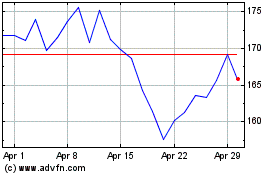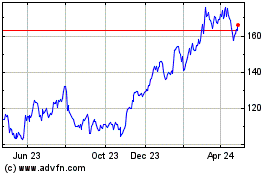U.S. Appeals Court Throws Out Antitrust Ruling Against Qualcomm -- Update
August 11 2020 - 1:28PM
Dow Jones News
By Brent Kendall
A federal appeals court on Tuesday threw out a trial judge's
antitrust judgment against Qualcomm Inc., ruling the federal
government hadn't shown the chip maker engaged in illegal
monopolization.
The San Francisco-based Ninth U.S. Circuit Court of Appeals
ruled the Federal Trade Commission hadn't shown that Qualcomm's
core business practices related to its cellphone chips and patents
were anticompetitive.
The appeals court, in a unanimous three-judge ruling, said San
Diego-based Qualcomm might have "acted with sharp elbows" but the
company's tactics were hypercompetitive, not anticompetitive.
The case dates back to the final days of the Obama
administration, when the FTC sued Qualcomm and challenged a central
company practice the commission described as "no license, no
chips."
The FTC said Qualcomm enjoyed monopolies in two types of modem
chips and adopted a framework in which phone makers couldn't
purchase those chips for their devices unless they also paid to
license Qualcomm patents covering a range of its intellectual
property. That structure made it difficult for phone makers to
challenge Qualcomm's royalty rates, and the arrangement also meant
those manufacturers were paying Qualcomm royalties even if they
used a competitor's chips in their phones.
Qualcomm said it achieved its market position lawfully,
developing and investing in breakthrough technologies, an argument
accepted by the appeals court. The company argued its licensing
practices were well-grounded because every cellphone invariably
uses its patented innovations.
Tuesday's ruling tossed out a decision issued last year by U.S.
District Judge Lucy Koh in San Jose, Calif., who ordered Qualcomm
to change its business practices after concluding the chip designer
improperly leveraged its dominance to keep tight reins on the
industry.
Qualcomm has been able to maintain business as usual during the
litigation because the Ninth Circuit previously put Judge Koh's
ruling on hold while it considered the company's appeal.
The case has unfolded amid unusual circumstances. FTC leadership
changed after President Trump took office, but the commission's
current chairman, Joseph Simons, is recused in the case and the
other four commissioners, two Republicans and two Democrats, have
been deadlocked, leaving a potential legal settlement with the
company out of reach.
Adding to the drama, the Justice Department, which shares
antitrust enforcement authority with the FTC, last year waded into
the litigation -- in support of Qualcomm.
Write to Brent Kendall at brent.kendall@wsj.com
(END) Dow Jones Newswires
August 11, 2020 13:13 ET (17:13 GMT)
Copyright (c) 2020 Dow Jones & Company, Inc.
QUALCOMM (NASDAQ:QCOM)
Historical Stock Chart
From Mar 2024 to Apr 2024

QUALCOMM (NASDAQ:QCOM)
Historical Stock Chart
From Apr 2023 to Apr 2024
